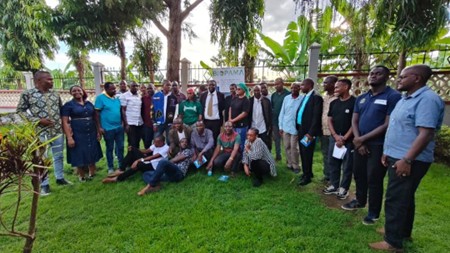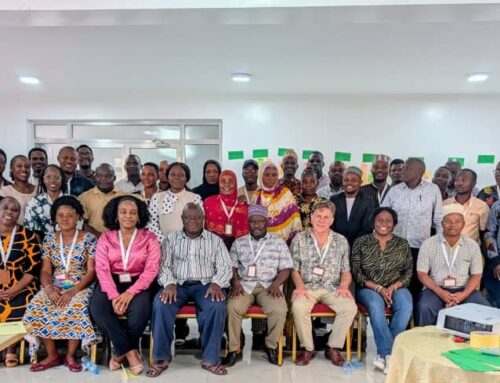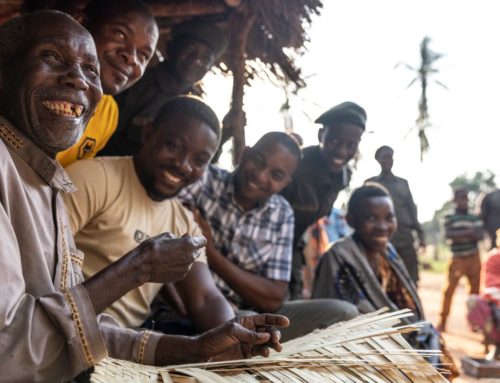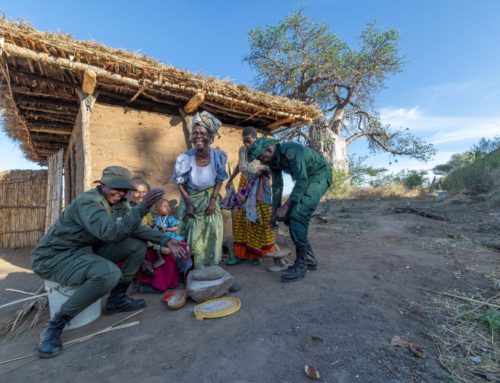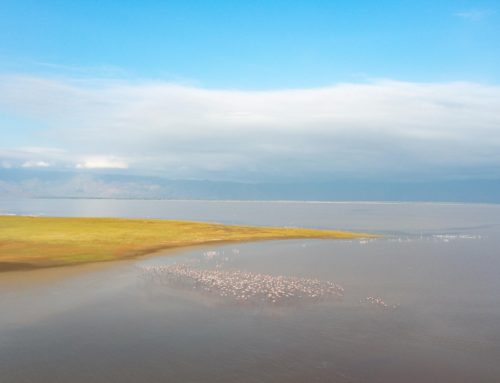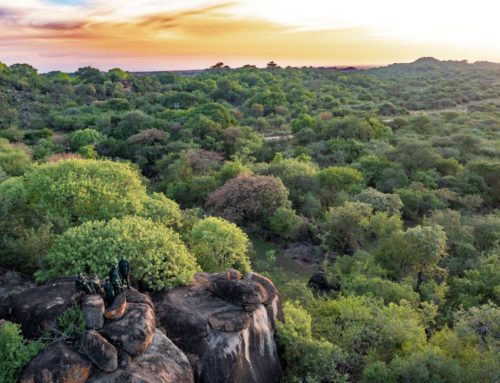Above is a group photo after a session to validate and approve the communication strategy for Burunge WMA as developed jointly by the governance and management teams from both the Honeyguide Foundation and Burunge WMA
Success Story: From Conflict to Collaboration: Unleashing the power of community ownership to transform governance in Burunge WMA
Project Name: Improving Local Community Livelihoods and Habitat Through Equitable Governance and Effective Management of Burunge Wildlife Management Area (WMA).
Create forums to engage stakeholders to discuss and resolve conflicts related to grazing and rangeland management, tourism and enterprise development, and sustainable natural resource use through meetings and communications.
Situated across one of the most critical wildlife corridors between Tarangire and Lake Manyara National Parks in Tanzania’s northern tourism circuit, Burunge Wildlife Management Area (WMA) spans 28,300 hectares across ten culturally diverse villages. Lauded as a community-driven conservation model, Burunge has historically attracted significant tourism investment, reflecting its unique position bridging two world-renowned wildlife destinations.
Yet, like many pioneering efforts, Burunge WMA encountered hurdles—namely, divergent stakeholder interests, historical conflicts over revenue distribution, and communication gaps that eroded trust. Determined to address these challenges head-on, Burunge’s newly elected governing body partnered with Honeyguide to launch a series of Stakeholder Forums, bringing together community members, tourism operators, and government agencies around one table.
As part of this initiative, four forums were formed, bringing together nearly 120 participants from diverse backgrounds. These included farmers, seven tourism operators (such as those in pottery, beekeeping, beadwork, weaving, and herbal medicine), private sector investors, grazers, government agencies, and natural resource teams from Burunge WMA’s 10 member villages. Their discussions focused on key challenges, including transparent revenue sharing, sustainable rangeland management, and ethical tourism.
These inclusive forums proved a turning point. Participants found common ground and developed practical solutions by openly sharing concerns—from livestock grazing and rangeland management to mitigating elephant crop raids. Transparent financial management practices and clearly defined roles built confidence among investors and local communities.
Some of the tangible wins have been:
Holistic Rangeland Management: One of the forums’ signature achievements was the creation of a Grazing and Rangeland Forum dedicated to Holistic Rangeland Management. This initiative introduced rotational grazing schedules, data-driven monitoring, and a network of local coordinators to reconcile livestock needs with ecological preservation. A grazing conflict that had persisted for years between the pastoralists and farmers as cattle was frequently straying into farms and damaging crops, Frustration on both sides often escalated into heated confrontations, and farmers pushed for stricter enforcement from Burunge WMA rangers, while herders felt unfairly targeted.
During the Grazing and Rangeland Forum, both groups came together to discuss a sustainable solution. Through facilitated dialogue, they agreed on a zoning system that designated specific corridors for livestock movement, reducing unintentional trespassing onto farmland. To strengthen this, the forum formalized a rotational grazing schedule, ensuring that livestock had designated grazing areas while crop fields remained protected.
The local grazing coordinators and village leaders were key in resolving the dispute. They took ownership of monitoring the grazing plan. Burunge WMA’s natural resource team provided technical support, using data-driven monitoring to adjust grazing zones based on pasture conditions. Within six months of implementation, reports of farm damage decreased by 70%, and both communities now engage in regular meetings to refine the system, transforming past conflicts into an ongoing collaboration.
“It has made it easier now,” remarks the newly elected chairperson. “Any conflict related to rangelands is handled by the community instead of seeing the rangers or WMA leaders as adversaries. A quick call can fix things.”
Equitable Tourism Structures: Clarified financial protocols and established regular stakeholder meetings so local artisans and entrepreneurs could benefit more directly from Burunge’s tourism boom.
Inclusive Governance: Elected committees now meet quarterly to review progress, troubleshoot challenges, and hold each other accountable—a transformative shift from the opaque decision-making of the past.
Reduced Human-Wildlife Conflicts: With chill fences, living walls, and more apparent land-use plans, participants aimed to cut crop raids and livestock predation by 60% within two years.
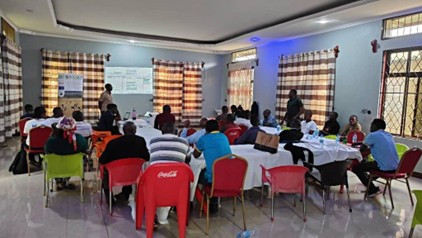
Above is a photo of a session during the approval of the conflict resolution mechanism as attended by members of the Authorized Association (‘AA’) for Burunge WMA

Above is a photo during a session for the training of Burunge WMA Rangers/Village Game Scouts(VGS) on data collection, HWC, and ecological change in Randilen WMA
This Success Story has been produced with the financial assistance of the European Union and the Organisation of African, Caribbean and Pacific States through the BIOPAMA Programme. The contents of this document are the sole responsibility of Honeyguide and can under no circumstances be regarded as reflecting the position of the European Union nor of the Organisation of African, Caribbean and Pacific States.

